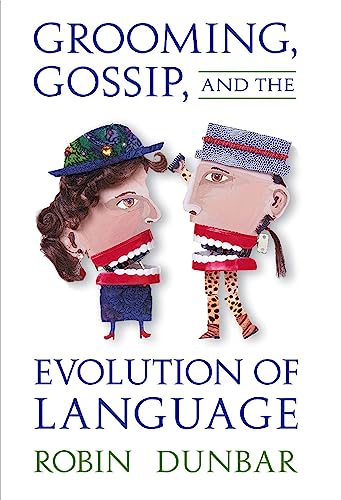Verwandte Artikel zu Grooming, Gossip, and the Evolution of Language

Inhaltsangabe
What a big brain we have for all the small talk we make. It's an evolutionary riddle that at long last makes sense in this intriguing book about what gossip has done for our talkative species. Psychologist Robin Dunbar looks at gossip as an instrument of social order and cohesion--much like the endless grooming with which our primate cousins tend to their social relationships.
Apes and monkeys, humanity's closest kin, differ from other animals in the intensity of these relationships. All their grooming is not so much about hygiene as it is about cementing bonds, making friends, and influencing fellow primates. But for early humans, grooming as a way to social success posed a problem: given their large social groups of 150 or so, our earliest ancestors would have had to spend almost half their time grooming one another--an impossible burden. What Dunbar suggests--and his research, whether in the realm of primatology or in that of gossip, confirms--is that humans developed language to serve the same purpose, but far more efficiently. It seems there is nothing idle about chatter, which holds together a diverse, dynamic group--whether of hunter-gatherers, soldiers, or workmates.
Anthropologists have long assumed that language developed in relationships among males during activities such as hunting. Dunbar's original and extremely interesting studies suggest otherwise: that language in fact evolved in response to our need to keep up to date with friends and family. We needed conversation to stay in touch, and we still need it in ways that will not be satisfied by teleconferencing, email, or any other communication technology. As Dunbar shows, the impersonal world of cyberspace will not fulfill our primordial need for face-to-face contact.
From the nit-picking of chimpanzees to our chats at coffee break, from neuroscience to paleoanthropology, Grooming, Gossip, and the Evolution of Language offers a provocative view of what makes us human, what holds us together, and what sets us apart.
Die Inhaltsangabe kann sich auf eine andere Ausgabe dieses Titels beziehen.
Über die Autorin bzw. den Autor
Robin Dunbar is Professor of Evolutionary Anthropology and Director of the Institute of Cognitive & Evolutionary Anthropology at the University of Oxford.
Von der hinteren Coverseite
Apes and monkeys, humanity's closest kin, differ from other animals in the intensity of their social relationships. All their grooming is not so much about hygiene as it is about cementing bonds, making friends, and influencing fellow primates. But for early humans, grooming as a way to social success posed a problem: given their large social groups of 150 or so, our earliest ancestors would have had to spend almost half their time grooming one another - an impossible burden. What Dunbar suggests - and his research, whether in the realm of primatology or in that of gossip, confirms - is that humans developed language to serve the same purpose, but far more efficiently. It seems there is nothing idle about chatter, which holds together a diverse, dynamic group - whether of hunter-gatherers, soldiers, or workmates. Anthropologists have long assumed that language developed in relationships among males during activities such as hunting. Dunbar's original and extremely interesting studies suggest otherwise: that language in fact evolved in response to our need to keep up to date with friends and family. We needed conversation to stay in touch, and we still need it in ways that will not be satisfied by teleconferencing, e-mail, or any other communication technology. As Dunbar shows, the impersonal world of cyberspace will not fulfill our primordial need for face-to-face contact.
„Über diesen Titel“ kann sich auf eine andere Ausgabe dieses Titels beziehen.
Gebraucht kaufen
Zustand: AusreichendGratis für den Versand innerhalb von/der USA
Versandziele, Kosten & DauerNeu kaufen
Diesen Artikel anzeigenEUR 28,83 für den Versand von Vereinigtes Königreich nach USA
Versandziele, Kosten & DauerSuchergebnisse für Grooming, Gossip, and the Evolution of Language
Grooming, Gossip, and the Evolution of Language
Anbieter: ThriftBooks-Atlanta, AUSTELL, GA, USA
Paperback. Zustand: Fair. No Jacket. Readable copy. Pages may have considerable notes/highlighting. ~ ThriftBooks: Read More, Spend Less 0.7. Artikel-Nr. G0674363361I5N00
Anzahl: 1 verfügbar
Grooming, Gossip, and the Evolution of Language
Anbieter: ThriftBooks-Atlanta, AUSTELL, GA, USA
Paperback. Zustand: Good. No Jacket. Pages can have notes/highlighting. Spine may show signs of wear. ~ ThriftBooks: Read More, Spend Less 0.7. Artikel-Nr. G0674363361I3N00
Anzahl: 1 verfügbar
Grooming, Gossip, and the Evolution of Language
Anbieter: True Oak Books, Highland, NY, USA
Paperback. Zustand: Good. First Paperback Edition. 5.5 X 0.6 X 8.5 inches; 230 pages; foxing on the top exterior edge of textblock. Stickers on the back cover. Good condition otherwise. No other noteworthy defects. No markings. ; Your satisfaction is our priority. We offer free returns and respond promptly to all inquiries. Your item will be packaged with care and ship on the same or next business day. Buy with confidence. Artikel-Nr. HVD-62821-A-0
Anzahl: 1 verfügbar
Grooming, Gossip, and the Evolution of Language
Anbieter: Revaluation Books, Exeter, Vereinigtes Königreich
Paperback. Zustand: Brand New. 240 pages. 8.25x5.50x0.75 inches. In Stock. Artikel-Nr. x-0674363361
Anzahl: 2 verfügbar
GROOMING GOSSIP & THE EVOLUTIO
Anbieter: moluna, Greven, Deutschland
Zustand: New. Über den AutorRobin Dunbar is Professor of Evolutionary Anthropology and Director of the Institute of Cognitive & Evolutionary Anthropology at the University of Oxford.KlappentextWhat Dunbar suggests-. Artikel-Nr. 867662201
Anzahl: Mehr als 20 verfügbar
Grooming, Gossip & the Evolution (USA)
Anbieter: AHA-BUCH GmbH, Einbeck, Deutschland
Taschenbuch. Zustand: Neu. Neuware - What Dunbar suggests--and what his research confirms--is that humans developed language to serve the purpose that grooming served, but far more efficiently. From the nit-picking of chimpanzees to our chats at coffee breaks, from neuroscience to paleoanthropology, this book offers a provocative view of what makes humans human. 5 illustrations. Artikel-Nr. 9780674363366
Anzahl: 2 verfügbar

